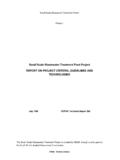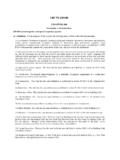Transcription of THE UN PRINCIPLES FOR RESPONSIBLE INVESTMENT AND …
1 INVESTMENT Division, Directorate for Financial and Enterprise Affairs Organisation for Economic Co-operation and Development 2 rue Andr -Pascal, Paris 75116, France THE UN PRINCIPLES FOR RESPONSIBLE INVESTMENT AND THE OECD GUIDELINES FOR MULTINATIONAL ENTERPRISES: COMPLEMENTARITIES AND DISTINCTIVE CONTRIBUTIONS This working document has been prepared by the OECD Secretariat with the Secretariat of the UNEP Finance Initiative as factual background information for the 2007 Annual OECD Roundtable on Corporate Responsibility The OECD Guidelines for Multinational Enterprises and the Financial Sector which will be held in Paris on 18 June 2007. It will be revised after the Roundtable. 2 I. Introduction 1. The UN PRINCIPLES for RESPONSIBLE INVESTMENT ( the PRI ) is one of the leading corporate responsibility instruments developed by the financial sector while the OECD Guidelines for Multinational Enterprises (MNEs) is the most comprehensive voluntary corporate responsibility instrument addressed by governments to multinational enterprises those operating from and in the 39 adherent countries to the OECD Declaration on International INVESTMENT and Multinational 2.
2 Despite their different scope and focus, both instruments share the common goal of enhancing the positive contribution of the private sector to economic, social and environment progress with a view to achieving sustainable development. 3. This document highlights the respective features of these two instruments by summarizing their premises and objectives, scope and coverage, and implementation and follow-up mechanisms. It is intended as factual background information for the 2007 Annual OECD Roundtable on Corporate Responsibility The OECD Guidelines for Multinational Enterprises and the Financial Sector, which will be held at the OECD on 18 June 2007. The Annex to the present document contains a comparative table based on the texts of the two instruments.
3 II. The OECD Guidelines for Multinational Enterprises 4. Premise: The OECD Guidelines are recommendations by governments to multinational enterprises (MNEs) operating in and from the territories of the 39 countries that adhere to the Guidelines. Designed to contribute to a favourable INVESTMENT climate, they aim to promote the positive contributions multinational enterprises can make to economic, environmental and social progress and to ensure that MNEs act in harmony with the policies of the countries in which they operate and with societal expectations. 5. The Guidelines are part of a broader, balanced instrument of rights and commitments the OECD Declaration on International INVESTMENT and Multinational Enterprises. The Declaration promotes a comprehensive, interlinked and balanced approach for governments treatment of foreign direct INVESTMENT and for enterprises activities in adhering countries.
4 The Guidelines are the means through which the OECD INVESTMENT Committee seeks to integrate RESPONSIBLE business conduct values into its work on international INVESTMENT so as to help it advance its mission of enhancing the contribution of INVESTMENT to growth and sustainable development. 6. Scope: The Guidelines are a multilaterally endorsed and comprehensive code of conduct that enjoy the backing of governments whose territories are home to almost 90 per cent of foreign direct INVESTMENT flows and to 97 out of the top-100 multinational enterprises. More specifically, the Guidelines establish non-binding PRINCIPLES and standards covering such areas as human rights, disclosure of information, anti-corruption, taxation, labour relations, environment, competition and consumer protection.
5 The Guidelines also encourage, where practicable, business partners including suppliers and sub-contractors, to apply PRINCIPLES of corporate conduct compatible with the Guidelines. 7. Implementation and accountability: Responsibility for promoting the recommendations in the Guidelines lies primarily with the adhering governments as does the administration of the Guidelines unique follow up mechanism. By adding the weight of adhering governments views to the general public 1 These are the 30 OECD countries and 9 non-member countries (Argentina, Brazil, Chile, Estonia, Israel, Latvia, Lithuania, Romania and Slovenia) that have adhered to them. Egypt is to adhere to the Declaration in July 2007. 3 debate on many issues in international business ethics, the Guidelines process has already succeeded in raising the legitimacy and profile of corporate attempts to address these issues.
6 8. The distinctive, government-backed implementation mechanisms of the OECD Guidelines include the operations of National Contact Points (NCPs). These are government offices located in each of the adhering governments. They are RESPONSIBLE for encouraging observance of the Guidelines and for ensuring that the Guidelines are well known and understood by the national business community and other interested parties. NCPs carry out the following responsibilities: promoting the Guidelines, handling enquiries about them, assisting in solving problems that may arise, gathering information on national experiences with the Guidelines, and reporting annually to the OECD INVESTMENT Committee 9. The fact that the Guidelines implementation processes are government-backed lends significant credibility to them.
7 Their distinct implementation procedures provide a unique channel for exploring concrete issues of business ethics. 10. The OECD Guidelines provide a unique follow-up mechanism for raising specific instances. This facility allows interested parties to call a company s alleged non-observance of the Guidelines recommendations to the attention of an NCP. Since the creation of the specific instance facility in 2000, it has been used one hundred ten times as a forum for discussing concrete problems of business ethics those encountered by managers on the ground. 11. NCPs are working together to refine their use of the specific instances procedure to ensure that all parties businesses, civil society and trade unions, other governments find it a useful tool.
8 Recent developments include the use of embassy networks and official development assistance programmes as sources of information about INVESTMENT projects in non-OECD countries and the issuance of public statements explaining the nature and conclusions of the discussions held under the specific instance. 12. The National Contact Points meet every year in order to engage in a peer review of their activities, including their handling of specific instances. In this way, Guidelines implementation involves continual improvement, both by NCPS and by other users. An annual report on implementation of the Guidelines is published which includes information on specific instances and how other parts of government ( export credit agencies) use the Guidelines in the context of their 13.
9 Responsibility for oversight of the functioning of the Guidelines falls to the OECD INVESTMENT Committee, which is expected to take steps to enhance the effectiveness of the Guidelines. It can also issue clarifications on the application of the Guidelines in specific circumstances. III. The United Nations PRINCIPLES for RESPONSIBLE INVESTMENT 14. Premise: The UN PRINCIPLES for RESPONSIBLE INVESTMENT is a joint initiative of the UN Environment Programme Finance Initiative and the UN Global Compact with the aim of incorporating ESG issues into mainstream INVESTMENT decision-making and ownership practices. The UN PRI is based on the premise that institutional investors and asset managers have a duty to act in the best long-term interests of their investors and therefore, need to give appropriate consideration to how environmental, social, and governance (ESG) issues can affect the performance of INVESTMENT portfolios.
10 By providing a framework for the integration of RESPONSIBLE business conduct into INVESTMENT strategies, the PRI contributes to the promotion of ESG objectives within the financial 2 OECD Guidelines for Multinational Enterprises: Annual Meeting of National Contact Points, available at ,2340,en_2649_201185_2512693_1_1_1_1, 3 UN PRINCIPLES for RESPONSIBLE INVESTMENT , available at 4 15. In early 2005 the United Nations Secretary-General invited a group of the world s largest institutional investors to join a process to develop the PRINCIPLES . Individuals representing 20 institutional investors from 12 countries agreed to participate in the Investor Group. The Group accepted ownership of the PRINCIPLES , and had the freedom to develop them as they saw fit.
















